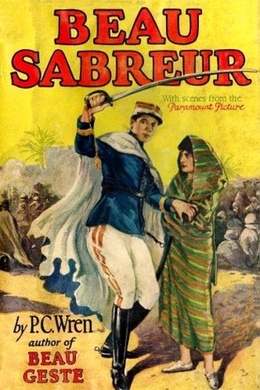
-
EPUB 443 KB
-
Kindle 473 KB
-
Support epubBooks by making a small $2.99 PayPal donation purchase.
This work is available for countries where copyright is Life+70 or less.
Description
Major de Beaujolais, courageous and gallant, is detailed for a dangerous secret missing among hostile Arabs. With two white women, snatched from the hands of fanatics, he ventures into the desert. Then, success within his grasp, he faces an agoninzing decision - his love, or his duty to France. A romantic adventure set in the Sahara desert, and the sequel to the successful Beau Geste.
382 pages with a reading time of ~6 hours (95744 words), and first published in 1926. This DRM-Free edition published by epubBooks, 2015.
Community Reviews
There are currently no other reviews for this book.
Excerpt
I will start at the very nadir of my fortunes, at the very lowest depths, and you shall see them rise to their zenith, that highest point where they are crowned by Failure.
* * * * *
Behold me, then, clad in a dirty canvas stable-suit and wooden clogs, stretched upon a broad sloping shelf; my head, near the wall, resting on a wooden ledge, a foot wide and two inches thick, meant for a pillow; and my feet near the ledge that terminates this beautiful bed, which is some thirty feet long and seven feet wide. It is as long as the room, in fact, and about two feet from the filthy brick floor.
Between my pampered person and the wooden bed, polished by the rubbing of many vile bodies, is nothing. Covering me is a canvas “bread-bag,” four feet long and two wide, a sack used for the carrying of army loaves. As a substitute for sheets, blankets and eider-down quilt, it is inadequate.
The night is bitterly cold, and, beneath my canvas stable-suit, I am wearing my entire wardrobe of underclothes, in spite of which, my teeth are chattering and I shiver from head to foot as though stricken with ague.
I am not allowed to wear my warm regimentals and cloak or overcoat, for, alas! I am in prison.
There is nothing else in the prison but myself and a noisy, nouveau riche, assertive kind of odour.
I am wrong–and I wish to be strictly accurate and perfectly truthful–there are hungry and insidious insects, number unknown, industrious, ambitious, and successful.
Some of my fellow troopers pride themselves on being men of intelligence and reason, and therefore believe only in what they can see. I cannot see the insects, but I, intelligent or not, believe in them firmly.
Hullo! there is something else…. A rat has run across my face…. I am glad so rude a beast is in prison. Serve him right…. On the whole, though, I wish he were not in prison, for he is nibbling at my ambrosial locks…. If I smite at him wildly I shall administer a severe blow to the brick wall, with my knuckles….
The door, of six-inch oak, is flung open, and by the light of the lantern in the hand of the Sergeant of the Guard, I see a man and a brother flung into my retreat. He falls heavily and lies where he falls, in peaceful slumber. He has been worshipping at the shrine of Bacchus, a false god. The door clangs shut and leaves the world to darkness and to me, and the drunken trooper, and the rat, and the insects.
I shiver and wriggle and scratch and wonder whether the assertive odour will conquer, or my proud stomach rise victorious over … Yes, it is rising … Victorious? … No …
Again the door opens and a trooper enters, thanking the Sergeant of the Guard, in the politest terms, for all his care and kindness. The Sergeant of the Guard, in the impolitest terms, bids the trooper remove his canvas trousers.
He does so, and confirms what the Sergeant had feared–that he is wearing his uniform trousers beneath them. The Sergeant of the Guard confiscates the nethermost garments, consigns the prisoner to the nethermost regions, gives him two extra days in this particular region, and goes out.
As the door clangs, the new-comer strikes a match, produces half a candle, lights it, and politely greets me and the happy sleeper on the floor.
“Let us put this one to bed,” he suggests, sticking his candle on the pillow-shelf; and I arise, and we lift the bibulous one from the hard floor to the harder, but less damp and filthy, “bed.”
Evidently a humane and kindly soul this. I stand rebuked for my callousness in leaving the drunkard on the ground.
But he does not carry these virtues to excess, for, observing that the Bacchanal has been cast into prison in his walking-out uniform (in which he was evidently brought helpless into barracks), he removes the man’s tunic, and puts it on over his own canvas stable-jacket.
“The drunk feel nothing,” he observes sententiously. “Why should the sober feel cold?”
I no longer stand rebuked.
